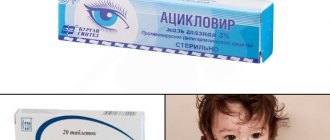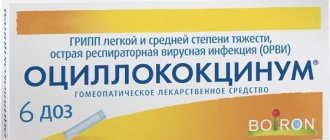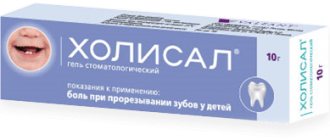- February 16, 2020
- Neurology
- Svetlana Morozova
Neurologists and pediatricians often recommend Glycine as a mild sedative. It is safe for children, but requires a doctor's prescription. This drug consists of the amino acid of the same name, which in the human body is produced by the liver independently. In addition, it is found in biological compounds and proteins. The acid has an antidepressant effect, as well as antitoxic, sedative and antioxidant. By stimulating metabolism in the meninges, it inhibits the action of neurons, which is what determines the effect of glycine. As a result, the child’s learning ability significantly improves, the ability to remember increases, hyperactivity decreases and the process of falling asleep becomes easier. The acid is available in the form of small pills, and the drug has an identical name - “Glycine”.
Medication indications for use
After visiting a neurologist, a small patient may be recommended Glycine. Why the drug is prescribed to children worries all caring parents. Doctors explain that the pills will not harm health, but only stimulate mental activity and reduce existing nervous tension.
It is reliably known that many nervous diseases have roots in childhood and mental trauma received at a tender age later affects future health. Pathologies can occur during pregnancy, childbirth, infancy or early childhood. And it is at this stage that it is much easier and more effective to deal with them.
Thus, sometimes “Glycine” is prescribed even to children under one year old. In this case, the general history and indications that are associated with deterioration of the nervous system are taken into account.
Glycine - what kind of medicine is it?
This drug is an amino acid that is actively produced in the body and is also found in mother's breast milk and some protein products. Glycine is a beneficial substance for children's health, which is similar in composition to a natural metabolite produced from living cells and protein.
The effect of the drug on the human body is as follows:
- improving sleep quality and eliminating insomnia;
- normalization of mental performance;
- restoration of healthy and full functioning of the central nervous system;
- regulation of metabolism;
- elimination of anxiety and tension on a nervous background;
- decreased aggressiveness;
- antitoxic effect on the body;
- relief from symptoms of cerebral and vegetative-vascular disorders.
A positive property of the drug is that it is not able to accumulate in tissues. The active substances of Glycine instantly penetrate into the biological fluids of the body, after which they are converted into water and carbon dioxide.
Can a child be given Glycine, and what age is optimal for treatment with the drug?
High sensitivity of the body to amino acids is considered the main contraindication to the use of the drug. Only in this case can Glycine cause serious harm to health. In other cases, the drug is completely harmless even for newborns. In the rarest cases, a child may develop an allergy to the medicine, as a result of which it is also necessary to stop taking it.
For a child’s body, it is important to choose the right dose so that it does not harm health, but at the same time provides a comprehensive treatment to the body. This also needs to be done correctly so as not to harm the nervous system or cause a general deterioration in the child’s health and well-being.
The dosage in each specific case is selected by the doctor, after which he carefully monitors the baby’s condition. If desired, the first dose of the drug can be given directly in the hospital, but this is not necessary.
How to understand that a child is suitable for treatment with Glycine? After the first doses of the medicine, you will be able to notice its effect on the body. If the drug causes negative health effects, the child's behavior will change for the worse. In this case, use should be discontinued.
Attention! It is unacceptable to take medicine without a doctor’s prescription! Many parents, believing that Glycine is completely harmless, give it to their child. They think that the drug will not cause any negative consequences for the child’s body. However, this is not true - taking it without a doctor’s testimony leads to the following problems:
- the child becomes restless, and children over 2 years old often begin to be capricious;
- the baby faints;
- the quality of sleep is disturbed;
- problems may occur on a mental level.
Such health problems can be avoided if parents give medicine to their baby only as prescribed by a doctor.
Glycine
Indications for children under one year of age
Newborns and babies up to one year old can be prescribed the drug. Among the main indications, neurologists highlight the following:
- hypoxia during childbirth;
- birth injury;
- hypertonicity of the lower and upper extremities;
- congenital encephalopathy;
- tremors of the legs, arms, chin or head;
- anxiety, high excitability;
- problems sleeping or staying asleep.
However, most often the medication can be recommended to patients after a year. The drug is necessary for:
- improving memory function;
- reducing fear and feelings of anxiety;
- reducing the impact of stress factors on the body;
- eliminate sleep problems;
- increasing mental activity;
- sleep restoration;
- eliminating inappropriate behavior associated with hyperactivity.
Thus, “Glycine” is a calming and activating drug for mental activity. At what age it can be given to children is indicated in the instructions, namely from birth. But for this there must be medical indications.
Doctors' opinion - should children be given Glycine?
Many mothers are afraid to give their children Glycine because they are sure that this medicine has a harmful effect on the child’s unformed body. However, this is not at all true.
Considering that this medicine is a natural component of protein products and is found in the human cellular structure, it is an absolutely safe drug for the child’s body.
In addition, this remedy has been used for a long time for therapeutic therapy and to support the vital functions of the brain of the child’s body, starting from birth.
So, why does a child’s body need Glycine:
- to solve various problems and sleep disorders;
- relieving anxiety;
- if the child has excessive tearfulness;
- if the child has problems and inhibition of mental development;
- to improve memory;
- during emotional instability;
- for various problems in the activity of the nervous system;
- during attention deficit disorder.
In addition, many pediatricians prescribe this amino acid to children to improve the level of intellectual activity, so that the child can more easily adapt to society.
Many specialists often prescribe this remedy. This is due to the fact that Glycine shows itself only on the positive side, eliminates signs of various disorders in the child’s behavior, and is also absolutely safe for the child’s body.
In addition, choosing the right dosage for your baby is very easy. This is due to the fact that the child’s reaction to the components of the drug can be traced at the very first stage of taking it.
In addition, in their reviews, many children's doctors note the main advantage of the drug - its versatility. Glycine can be used as a sedative, as well as to improve mental performance and stimulate the brain activity of children.
At the same time, a slight adjustment of the daily dosage of the drug allows you to achieve the desired result without changing the medication.
It is worth taking into account that Glycine is a nootropic. This product consists only of amino acids that are produced by human bodies. For this reason, the drug does not affect other systems of the body, and also does not cause addiction or side effects.
Since the drug is based on natural components found in the cells of the body, Glycine cannot have a harmful effect on the baby’s health, so it is often prescribed to them for home therapy.
For children over 2 years of age, the drug is prescribed to:
- restore memory;
- improve sleep;
- normalize emotionality;
- reduce nervous disorders;
- get rid of causeless tearfulness;
- reduce anxiety;
- restore mental development.
For a one-year-old child and children under one year old, Glycine is prescribed to normalize sleep, with frequent crying and restlessness.
The medicine is also prescribed to children who cannot independently adapt to society. In other words, they look at everything with aggression, which accompanies them throughout life. Since Glycine improves the functioning of the brain and intellect, it becomes easier for the child to find a “common language” with peers, as well as conduct dialogue with them.
Properties of glycine
For children 2-3 years old who are inactive in terms of communication, the therapeutic composition will help them feel more confident, overcome shyness, and also adapt more quickly to a new unfamiliar team.
The scope of the medicine is quite large, so before giving the medicine to children, you must consult a specialist.
Experts believe that infants, infants and children over 2 years of age can take the medicine as it is effective, safe and effective. In addition, the effect of taking the tablets is ensured soon after taking them. And it is not difficult to maintain the dosage of Glycine.
Also among the advantages of the drug, according to pediatricians, is the versatility of the product. The tablets work great as a brain stimulant and sedative.
It is important to note that although Glycine is a nootropic, it contains only amino acids produced by the human body. Therefore, the drug is not addictive and does not have a negative effect on the body systems. Another advantage of Glycine is the absence of side effects.
Before use, I strongly recommend that you read the complete instructions for the drug.
From the mouths of attentive mothers who are worried about the health of their baby, you can often hear the question whether Glycine is ok for children. In order to get an answer to this, you need to figure out what kind of drug it is. This medicine basically contains the essential amino acid glycine. It is always present in the body of every person. Its second name is aminoacetic acid.
Considering these features, Glycine can be called one of the safest drugs. Pediatricians often recommend it for children, regardless of age. If there are certain indications, the medicine is included in the list of medical prescriptions for the treatment of infants. Experts are completely confident in the safety of the medicine.
Among the common questions of parents whose children are prescribed the drug is at what age can Glycine be given to children and how to give it. The instructions for the medicine do not provide any information regarding the age of the patients taking it. Pediatricians often prescribe medicine to newborns and infants to normalize the functioning of the nervous system, improve brain function and normalize sleep.
Glycine is also prescribed for older children. In this case, doctors pursue the goal of improving brain activity. When taking this amino acid, there is an improvement in concentration, which has a beneficial effect on school performance. Children begin to remember information better and quickly navigate the material they have studied. In addition, the drug helps maintain the overall tone of the body.
As noted above, Glycine contains the amino acid of the same name, and therefore is not capable of causing harm to the body. This substance enters the body with food. The basis of a baby’s diet is breast milk, and if there is not enough of it, the baby begins to experience a glycine deficiency, which affects the functioning of the nervous system.
- improvement of metabolism;
- eliminating anxiety;
- stimulation of brain activity;
- improved sleep;
- elimination of aggressiveness.
Glycine is often prescribed for children in order to improve the process of adaptation in society. Many children, starting to attend kindergarten, show aggression towards the children around them. The drug helps to increase intelligence, as a result of which children begin to better seek common ground with their peers.
As noted above, the drug contains an amino acid that is harmless to the human body. Given this fact, doctors prescribe Glycine tablets to children with little or no fear. However, there are cases when taking the drug is prohibited. The main contraindication is individual intolerance. If after 1-2 doses of the medication no negative changes are observed, treatment with the drug is continued according to the regimen prescribed by the doctor.
The drug is available in the form of Glycine tablets. These are small, flat, white, odorless pills with a sweetish taste. This type of medication is directly prescribed for the treatment of children. Glycine forte can also be taken by children, but in this case it is necessary to take into account a larger dosage of the medicine compared to the usual form.
Are there possible side effects?
The annotation for the product contains information that “Glycine” does not belong to the group of sedative medications. It can still cause side effects in children, because the drug actively affects metabolism. It is also worth considering that the state of the nervous system is different for each child and has individual characteristics. Therefore, doctors sometimes state the opposite effect to what was expected. Instead of calming down, the baby becomes overly excitable. Signs of developing neurosis may also be observed.
Thus, only a doctor should prescribe “Glycine” for children, and it is important for parents to monitor the child’s condition and report any unforeseen situations to the doctor. Undesirable symptoms may include:
- moodiness;
- difficulty falling asleep;
- frequent awakenings at night;
- discomfort caused by unknown reasons.
A neurologist will comprehensively evaluate all the symptoms and find out what their cause is. If the medication has such a negative effect on the condition, then it is discontinued and an analogue is prescribed.
Is the medicine harmful to the child's health?
The only contraindication to taking Glycine is hypersensitivity to the amino acid. Usually, this remedy does not harm the child’s body. Among the side effects, in rare cases there are allergic reactions to the components of the product.
But you should still strictly adhere to dosages. The wrong dose can have a negative impact on the central nervous system and cause various effects, as well as unwanted reactions.
Attention! In the first 1-2 days of taking this drug, it is necessary to monitor the child’s behavior; this will help to identify unwanted reactions in time and understand that the drug is not suitable for him.
Sometimes some parents do not consult with specialists and start giving Glycine on their own, while they do not comply with the dosage and number of doses per day.
As a result, the child may experience fainting, even worse sleep and severe anxiety, noticeable inhibition of nervous reactions and sometimes mental disorders.
But all this can be avoided, you just need to consult with a specialist in advance so that he can accurately prescribe the dosage and, if necessary, adjust it.
Glycine
How much glycine to give to a child
Despite the relative safety of the drug, it should be recommended by a neurologist or pediatrician. Uncontrolled use of the medicine can lead to serious disorders in the nervous system. Only a specialist will be able to assess the general condition of a small patient, his developmental characteristics, as well as the process of pregnancy and the course of childbirth. Taking everything into account, an individual course of treatment and the correct dosage are prescribed.
There is no special form of glycine for children. The instructions for use, however, contain information about the use of the medicine by this group of patients:
- patients under 3 years of age are offered 50 milligrams of glycine at a time;
- After 3 years, it is recommended to offer 100 milligrams of acid at a time.
The number of doses per day depends entirely on the medical history and indications.
Rules of application
"Glycine" for children can be recommended by a neurologist or pediatrician. The drug has its own indications, and the frequency of administration and duration of treatment depend on the diagnosis.
If the baby has diseases of the nervous system, manifested by problems with sleep, hyperactivity or excessive agitation, then patients under 3 years of age are prescribed 50 milligrams of glycine 2-3 times a day. The course lasts a week or 10 days. Then the frequency is reduced to once a day and the tablets are taken for another 10 days.
When the baby is already 3 years old, he is prescribed 100 milligrams of glycine at a time. Take 2-3 times a day for one to two weeks. The doctor may recommend continuing treatment for up to a month if indicated.
How to use Glycine correctly
To ensure that the medicine does not harm your health, it must be taken correctly. In this case, the main importance is the age of the child who needs treatment, the desired effect of Glycine and the individual reactions of the baby’s body.
Children under one year old need to take 0.25-0.5 tablets to normalize their general condition and remove some symptoms of lack of acids in the body. Before giving the medicine, it should be crushed and then applied to the pacifier or placed under the tongue (on the inside of the cheeks).
A child 2-3 years old should be given half a tablet in the same way.
Attention! The medicine should not be dissolved in water or other liquids, as it will not be able to be absorbed into the lymph and bloodstream. As a result, Glycine will not have a therapeutic effect on the body.
Children over 8 years of age and adolescents can be given a whole tablet. At the same time, it does not need to be crushed in advance. Since glycine tastes sweet, the child will probably not refuse to take a medicine that will remind him of candy.
The number of tablets taken depends on the age of the child. On average, he should take the drug 2-3 times a day. The course of treatment is prescribed by a doctor depending on the health status of the children. Usually it does not exceed 15 days.
To the question - is it possible to give Glycine to children, we answered. Now it is important to understand whether the drug is harmful to health?
Methods of administration
It is a small pill with a sweetish taste “Glycine”. At what age it can be given to children is already written above. But how to take the pills correctly is described below.
If the child is already able to listen to the parents’ recommendations, then the reception will be sublingual. In other words, the pill is placed under the child’s tongue or cheek and he slowly absorbs it.
Small children and infants are not yet capable of such actions. Therefore, a different method of administration is proposed for them. The tablet can be crushed to a powder and, after dipping a pacifier in it, offer it to the child. If this method does not suit you for some reason, then dissolving the powder in a spoonful of water is allowed. But only one teaspoon is needed, and after that it is not recommended to give your baby more to drink. This is necessary for glycine to be absorbed into the tissues of the oral cavity.
It is important to monitor the child and his reaction during treatment. Even the slightest changes in behavior are a reason to immediately visit a doctor.
Overdose and side effects for children
In most cases, children tolerate Glycine well - side effects and overdose are possible as a result of a violation of the medication regimen or a violation of the specified dose. In such cases, mothers may observe sudden weakness in the child, apathy, lethargy, and drowsiness. The drug helps lower blood pressure, so it is not prescribed to children with hypotension.
If the dosage prescribed by the doctor is exceeded, the baby may become lethargic, lethargic, drowsy, distracted, and weak. In addition, blood pressure may decrease and heart rate may increase. For this reason, in order to avoid possible problems, parents should carefully study the instructions for the drug regarding the components contained in it and the dosage of the active component.
Sometimes taking it can cause the development of side effects in the form of:
- skin reactions (nettle fever, rashes, itching);
- dizziness;
- stomach discomfort and vomiting;
- lowering blood pressure;
- anxiety;
- insomnia.
The mechanism of action of the drug is as follows:
- regulation of metabolism in the body;
- normalizes the inhibition of protective processes that occur in the central nervous system;
- has an enhancing effect on the work process of mental life;
- relieves psycho-emotional tension and anxiety;
- has an antitoxic and antioxidant effect on the body;
- reduces feelings of aggressiveness, improves social adaptation;
- has a positive effect on sleep;
- leads to relief of symptoms of vegetative-vascular and cerebral disorders.
Once ingested, the drug does not accumulate in the body. It is evenly distributed throughout all tissues, enters almost all biological fluids and then turns into the state of carbon dioxide and water.
Such a different glycine
Pharmacies can offer glycine in various preparations:
- “Glycine” (), where one tablet contains 100 milligrams of the active ingredient.
- “Glycine” (“Ozone”), which already contains 200 milligrams of the active substance.
- "Glycine Bio" ("Pharmaplant"), containing 100 milligrams of glycine in each pill.
The pharmaceutical market also offers a drug from the Evalar company - Glycine Forte. In addition to acid, it also contains vitamins: B12, B6, and B1. But it is not prescribed to children.
Due to the fact that the maximum dosage of glycine for children is 100 milligrams, the most preferred drug “Glycine” is the product from. If necessary, simply divide the pill in half.
Indications for use
The substance is a nootropic and at the same time a neurotransmitter. It has the following properties:
- stimulates the metabolism of neurocytes;
- improves brain activity, memory, increases performance;
- calms the nervous system, reduces psycho-emotional stress;
- inhibits the production of adrenaline and norepinephrine;
- helps restore brain function after injury or stroke;
- accelerates the elimination of toxic substances.
Interesting! Glycine has a mild effect and is produced by the body.
Doctors prescribe drugs based on it to adults and children in the following cases:
- attacks of aggression;
- increased irritability;
- psycho-emotional stress;
- panic attacks, neuroses and other central nervous system disorders;
- sleep disorders;
- decreased mental abilities.
Now Foods, Glycine, Pure Powder, 454 g
★★★★☆
1 202 ₽
Buy at a discount
The amino acid is also used as part of complex therapy for stroke and for alcohol dependence, as it reduces the severity of the consequences of hemorrhages, side effects of antipsychotics, sleeping pills, and antidepressants. Glycine also helps with impaired digestion, diseases of the representative gland, reduces the inflammatory process, and inhibits tumor growth.
Note! The amino acid produces a more pronounced therapeutic effect when it is deficient in the body.
Watch the video, which talks in detail about the indications, contraindications and adverse reactions of glycine:
Feedback about the drug
If you study the reviews, you can conclude that they are completely different. Thus, most parents often use this amino acid to reduce their child’s hyperexcitability, reduce the manifestations of mental disorders, normalize sleep and improve learning ability. In addition, the product has virtually no contraindications, so it inspires confidence. Affordable cost is another important argument in favor of Glycine.
Many parents note that the effect of treatment is visible within a few days, a maximum of a week. Children sleep better, become calmer and more balanced, their anxiety goes away and their general condition improves.
However, some indicate the absence of any effect from treatment at all. Others claim that moodiness, on the contrary, increases, sleep problems appear and allergic reactions occur.
But still there are much more positive responses. The drug is relatively safe, it can be prescribed even to newborns. As a result, you can get rid of hypertension and eliminate anxiety.
Glycine in food
Glycine can be obtained not only artificially. The daily amino acid requirement for children is 0.1 grams. You can make up for the deficiency with the right foods. There is a lot of glycine in gelatin, so marmalade and jelly should be offered to children. It is also found in protein-rich foods:
- bird;
- fish;
- liver;
- beef;
- eggs;
- cottage cheese.
Products of plant origin also do not lag behind in glycine content. Most acid in:
- buckwheat;
- nuts;
- oats;
- soy;
- ginger;
- sunflower and pumpkin seeds;
- brown brown rice.
Thus, in order to replenish glycine reserves in the body, it is important to follow the principles of a balanced diet. If there is a deficiency, the doctor will prescribe tablets that have proven themselves and have many positive reviews.











